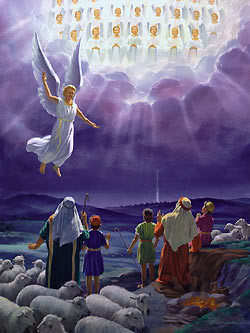
"For ye are dead, and your life is hid with Christ in God." — Colossians 3:3 (KJV).
True liberty of spirit is found in those, and in those only, who, in the language of De Sales, "keep the heart totally disengaged from every created thing, in order that they may follow the known will of God." In other words, it is found with those who can say, with the Apostle Paul, that they are "dead, and their life is hid with Christ in God." The ruling motive in the breast of the man of a religiously free spirit is, that he may, in all cases and on all occasions, do the will of God. In that will his "life is hid." The supremacy of the divine will, in other words, the reign of God in the heart, necessarily has a direct and powerful operation upon the appetites, propensities, and affections; keeping them, each and all, in their proper place. As God rules in the heart, every thing else is necessarily subordinate. It is said of the Savior himself that "he pleased not himself," but that he came "to do his Father's will."
Another thing, which can be said affirmatively and positively is, that those, who are spiritually free, are led by the Spirit of God. A man, who is really guided by his appetites, his propensities, or even by his affections, his love of country, or any thing else other than the Spirit of God, cannot be said to be led by that divine Spirit. The Spirit of God, ruling in the heart, will not bear the presence of any rival, any competitor. In the heart of true liberty the Spirit of God rules, and rules alone: so that he, who is in the possession of this liberty, does nothing of his own pleasure or his own choice. That is to say, in all cases of voluntary action, he does nothing under the impulse and guidance of natural pleasure or natural choice alone. His liberty consists in being free from self; in being liberated from the dominion of the world; in lying quietly and submissively in the hands of God; in leaving himself, like clay in the hands of the potter, to be molded and fashioned by the divine will. Natural liberty may be said to consist in following the natural sentiments; in doing our own desires and purposes, which naturally throng in upon the soul and take possession.
It is like a strong man, that is under the complete control of his irregular passions. Spiritual liberty consists in passively, yet intelligently and approvingly, following the leadings of the Holy Ghost. It is like a little child, that reposes in simplicity and in perfect confidence on the bosom of its beloved mother. Natural liberty combines, with the appearance of liberty; the reality of subjection. He, who has but natural liberty, is a slave to himself. In spiritual liberty it is just the opposite. He, who is spiritually free, has entire dominion over himself. Spiritual liberty implies, with the fact of entire submission to God, the great and precious reality of interior emancipation. He, who is spiritually free, is free in God. And he may, perhaps, be said to be free in the same sense in which God is; who is free to do every thing right and nothing wrong.
This is freedom indeed. This is the liberty, with which Christ makes free. This is emancipation, which inspires the songs of angels; a freedom, which earth cannot purchase, and which hell cannot shackle.
— edited from The Interior or Hidden Life (1844) Part 2, Chapter 14 by Thomas Cogswell Upham. You can find more of his work at the blog, The Hidden Life, managed by Craig L Adams at: http://thomascupham.blogspot.com
 RSS Feed
RSS Feed